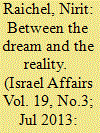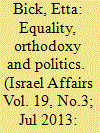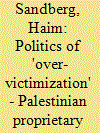|
|
|
Sort Order |
|
|
|
Items / Page
|
|
|
|
|
|
|
| Srl | Item |
| 1 |
ID:
122064


|
|
|
|
|
| Publication |
2013.
|
| Summary/Abstract |
Eliezer Ben-Yehuda is mainly known for his role in reviving the Hebrew language and for struggling against ignorance. Yet a close reading of his family's press reveals the pioneering role of this enterprise with regard to the depictions of East Asia. Through their press, the Ben-Yehuda family introduced East Asia to the Jewish public in Ottoman Palestine at the turn of the twentieth century, while making a unique contribution to contemporaneous Zionist thinking, first, within the context of advancing the ideas of modernism and national revival, and second, by constructing another Oriental Other.
|
|
|
|
|
|
|
|
|
|
|
|
|
|
|
|
| 2 |
ID:
122070


|
|
|
|
|
| Publication |
2013.
|
| Summary/Abstract |
The article deals with the dream and the reality during the development of vocational education in Israel from 1948 to the end of the twentieth century and refers both to education for manual labour as a value and to the attempt at practical guidance of students towards productivity and vocational education. It describes the gap between leaders' statements - declaring their commitment to educate the younger generation to be productive and work oriented - and the actual focus on policies of expanding academic high schools while marginalizing vocational schools time and time again.
|
|
|
|
|
|
|
|
|
|
|
|
|
|
|
|
| 3 |
ID:
122063


|
|
|
|
|
| Publication |
2013.
|
| Summary/Abstract |
The hallmarks of the Revisionist political platform, such as opposition to the project of the enlarged Jewish Agency or the idea of fundamental land and fiscal reform in Palestine aimed at an intensification of the settlement endeavour, began to appear spontaneously, particularly in Russo-Ukrainian Zionist circles, during the second quarter of 1922. The so-called 'Our Platform', a series of articles setting out the Revisionist proposals, published in March 1924, was a joint undertaking and the culmination of numerous, sometimes inconclusive, discussions. The creation of the Union of Zionists-Revisionists sealed this process in 1925. The aim of this article is to investigate the three-year prelude to the organized Revisionist movement, highlighting the role performed by activists, almost all of whom have been forgotten over time (J. Brutzkus, S. Gepstein, J. Schechtman and I. Trivus, among others). It identifies the opposition to the enlarged Jewish Agency project (and not the rejection of the White Paper of 1922) as the main galvanizing point of the process. Last, but not least, it argues that many of the political notions commonly attributed to Jabotinsky actually originated with others among the Revisionist founders.
|
|
|
|
|
|
|
|
|
|
|
|
|
|
|
|
| 4 |
ID:
122068


|
|
|
|
|
| Publication |
2013.
|
| Summary/Abstract |
National service was a controversial issue in Israel in the early years of the state. A law requiring religious girls exempted from the military to do two years of mandatory civic service was passed in August 1953 and never implemented. This article examines the political controversy surrounding the adoption of the national service law and concludes that David Ben-Gurion advanced the law mainly for political reasons in order to counterbalance concessions made to the orthodox. Moreover, consistent with his mamlachtiyut (statist) philosophy, he was unwilling to consider any compromise proposals other than a mandatory government-run programme. Pressure from the religious parties caused his successor, Moshe Sharett, to concede on the implementation details, voiding the law of content. Subsequent governments acceded to orthodox demands to freeze the law. In 1971, a more pragmatic Labour government headed by Golda Meir instituted a programme of voluntary national service which provided needed manpower to the development towns and fulfilled the wish of girls from the religious Zionist sector to give service to the nation.
|
|
|
|
|
|
|
|
|
|
|
|
|
|
|
|
| 5 |
ID:
122069


|
|
|
|
|
| Publication |
2013.
|
| Summary/Abstract |
Maayan Hahinuch Hatorani is a Haredi (ultra-Orthodox) educational network for elementary aged children in Israel, founded by Shas, a Sephardi ultra-Orthodox political party. The network's beginnings were in the second half of the 1980s, during the Shas' first Knesset term. It then consisted of around 30 small Talmudei Torah (Haredi elementary schools for boys), set up independently by Sephardi Haredi educational activists. This article describes their motives and activities in establishing schools for the Mizrahi community and explains the decisive contribution of two additional factors to the establishment of Maayan Hahinuch Hatorani: the senior Sephardi rabbis who awarded religious legitimacy, and the Shas Movement which provided political and financial support.
|
|
|
|
|
|
|
|
|
|
|
|
|
|
|
|
| 6 |
ID:
122066


|
|
|
|
|
| Publication |
2012.
|
| Summary/Abstract |
International human rights NGOs utilize soft power resources to shape discourse on state compliance with the Laws of Armed Conflict (LOAC), as well as related policy decisions. The NGO impact is generally due to perceived expertise, credibility and commitment to universal principles. This article examines these factors in the NGO campaign in the UK calling for an arms embargo against Israel. NGO reports and activities created the basis for the July 2009 decision by the British government to cancel five military export licences. However, as shown, these reports contain problematic methodologies, inaccurate claims, and controversial interpretations of international law.
|
|
|
|
|
|
|
|
|
|
|
|
|
|
|
|
| 7 |
ID:
122071


|
|
|
|
|
| Publication |
2013.
|
| Summary/Abstract |
The phenomenon of mergers and acquisitions is an ancient one, yet it has gained considerable momentum in recent years. It has also taken root in Israel as local companies utilize mergers as a strategic means for promoting growth and efficiency. The information granted to investors undergoes three main events: rumour of the merger, the declaration of the merger, and its execution. In this article, the merger phenomena in the Israeli market are examined from a different angle. This research attempts to characterize each event using two approaches: in the first, the differences in abnormal returns between the different stages are examined, for both acquiring and target firms. In the second assessment, the dependence of abnormal returns on the number of days between declaration and execution is examined, for both types of firms. The results of the first approach revealed that acquiring companies face negative abnormal returns, while target companies face positive abnormal returns during the days of the events. The second approach exposed a certain investor predilection for different time ranges - i.e. investors favour mergers that are executed in the medium and long term, as opposed to short-term mergers.
|
|
|
|
|
|
|
|
|
|
|
|
|
|
|
|
| 8 |
ID:
122065


|
|
|
|
|
| Publication |
2013.
|
| Summary/Abstract |
Jerusalem's status has remained indeterminate since the approval of the UN General Assembly Resolution 181 in November 1947. Following the 1948 war, the US acknowledged de facto Israeli and Jordanian control in their respective sectors of Jerusalem, but refused to recognize Western Jerusalem as Israel's capital. After Israel captured the Old City during the 1967 Six Day War, the question of the city's status became a focus of US and British concern. The two states formulated a variety of proposals regarding the future of the city and the holy places. In the end, however, they realized that no agreed formula could be found, and therefore they refrained from taking a clear stand on the issue and did not offer the UN and the belligerents a comprehensive plan.
|
|
|
|
|
|
|
|
|
|
|
|
|
|
|
|
| 9 |
ID:
122067


|
|
|
|
|
| Publication |
2013.
|
| Summary/Abstract |
The 'over-victimization syndrome' is a tendency to present an embellished picture of the damage caused to a party in order to enhance public support. It affects the presentation of Palestinian political claims in few contemporary actual legal proprietary issues: Israeli settlements on private Palestinian land in the West Bank, Israel's policy towards Palestinian tenants in the Sheikh Jarrah neighbourhood of East Jerusalem and the rehabilitation of the Neirab Palestinian refugee camp in Syria. The article argues that the syndrome leads to both political bias and more unnecessary suffering.
|
|
|
|
|
|
|
|
|
|
|
|
|
|
|
|
| 10 |
ID:
122062


|
|
|
|
|
| Publication |
2013.
|
| Summary/Abstract |
In his speeches and writings as Prime Minister, David Ben-Gurion often used messianic language. In the late 1950s this policy evoked strong criticism in wide circles of the Israeli political and intellectual elite. The fear was that the combination of sweeping messianic ideas and Ben-Gurion's political might would inflict an irreparable blow to Israeli democracy. This article shows that, contrary to the claims of prominent Israeli intellectuals, Ben-Gurion's 'messianism' did not reflect a pretension to hasten the end of history but a desire to use the Jewish prophetic vision as a compass that would spur Israelis to express their human sovereignty and create a civilized society.
|
|
|
|
|
|
|
|
|
|
|
|
|
|
|
|
|
|
|
|
|